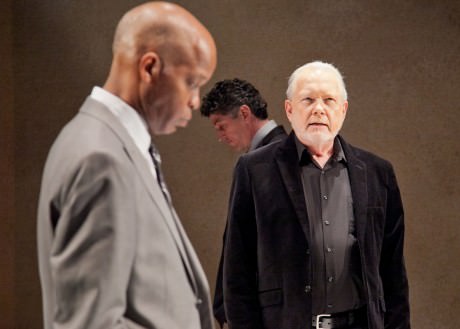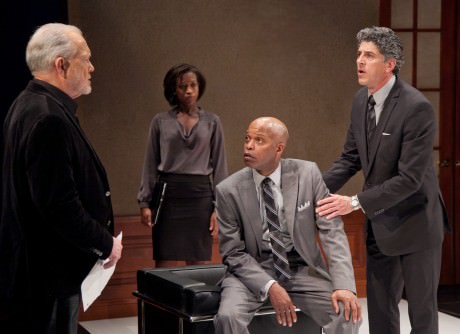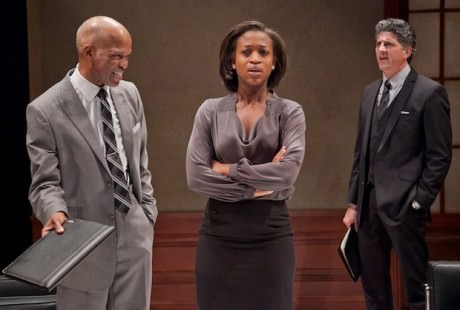Race Matters
The Crime: Rape. Or is it Race?
The Defendant: Charles Strickland is a man who doesn’t comprehend being told “No,” and one who has never had to beg for anything. A wealthy, older white Executive with some notoriety, he is accused of raping an African-American woman in his hotel room. Strickland is ready to fight this criminal charge.
The Prosecution: Evidence abounds. There is a statement taken from the chambermaid . . . , witness testimony from a married couple in the hotel room next door . . . , and . . . a red sequined dress.
The Defense:
David Mamet’s Race, the theatrical production currently playing at Theater J in Washington, D.C., is the fury of what happens when an accused man proclaiming his innocence, asks a boutique law firm of a black and white attorney to defend him, and how white privilege, racial guilt, stereotype insensitivity, and the blind ambition of the lawyers intersect. The lawyers utilize a tag team, attorney/client interaction to unveil the truth – or rather, to strategize and determine how and if this case is worthy of their defense. The four characters in this production find themselves in a quandary when a new lawyer gets overly involved, and the masked agendas and long felt opinions that smolder beneath the surface explode.

Is their client, Charles Strickland (Leo Erickson) lying to himself – as much as the lawyers’ suspect that he may be lying to them?
The evidence, along with his protestations of innocence, set up a heated and frenzied debate of trust, shame, guilt, and the embattled relationship between blacks and whites and America’s connected troubled past. Leo Erickson’s solid performance on Opening Night was still developing into the defensive, self-righteous, heel with airs that we are led his character to be. The edge is there, and he’s a little suave, but with Erickson, you know he’s digging deeper.
The astute direction of John Vreeke keeps the pace and unfolding structure of Race moving while maintaining a heightened sense of tension throughout. Just when you think a situation has resolved its self, another incendiary confrontation or verbal twist is ignited. Jared Mezzocchi’s projection design of African American images including lynchings, blackface, and the beating of Rodney King in between scenes, add flavor to the rancor and dissent exhibited among the four characters. The striking modern set design by Mischa Kachman and Andrew Griffin’s lighting design makes a bold statement without deterring from the drama on hand.
Race influences our perspectives and understanding of certain events in life.
This play attempts to challenge audiences and confront their understanding of the racial dynamics and myths concerning race. The audience quickly discovers Mamet’s world view of justice, and law and order are the subtext that brings race to the forefront in this taut, blistering drama and challenging 80 minutes of theater play.
Michael Anthony Williams is quickly becoming one of my favorite actors in the D.C. area. When you see that Williams is listed in a cast, you can be certain that it will be a performance (and a production) that you don’t want to miss. His performance last year in Bay Theatre Company’s Master Harold . . . and the Boys left a lasting impression, memorable for the nuanced sensitivity and intense determination Williams captured with the Sam character. In Race, this impressive actor’s palette of technique and talent is on full display as the black law partner, Henry Brown. Williams finesses the Mamet dialogue with skillful dexterity and emotional fortitude, and his ingenious display of humor perfectly situated at heightened moments when the audience needs relief from the verbal swordplay, is what he does best.
Both James Whalen and Jack Lawson, the smug, white law partner he portrays, are on top of their game from the opening moments when Whelan steps on the stage. As the most fully developed character, Whalen shines in the repartee interplay between the other characters – whether it’s a tit for tat with his client Charles, or an employer relations showdown with Susan, the attractive, black, new hire that he’s mentoring.

Crashonda Edwards (Susan) has a tough part. Edward’s body language and controlled tones at different points throughout the play say one thing, but it’s what her character says or perhaps more importantly what she doesn’t say that reveals Susan’s true self. Her character has certainly decided what side of the fence she is on in this racial legal saga, I would have preferred that this would have been more evident in her performance. To be fair, the Susan character is written with unbelievable identity motivations by Mamet.
While the Theater J Race ensemble is an engaging, recommended production, and speaking as an admirer of much of Mamet’s past theatrical work, films, and film direction, I don’t love this play. Race is personal, and so is Mamet’s writing. As such, race – especially how it’s presented in this play – reveals more than ever before, an evolving Mamet viewpoint that I don’t much agree with or like.
The man has talent and something to say. A Pulitzer Prize winner for Glengarry Glen Ross, the way Mamet constructs dialogue and his flair for language is a highlight with any of his work. He is certainly entitled to write a play expressing his views on justice and race relations. But Race feels didactic, and a more honest and authentic discussion of race among the characters would have made this play resonate more powerfully for me as a theatrical production; instead it serves more as a conversation piece for how misguided Mamet’s overreaching conservative themes are.
Mamet’s oversimplifications on the complex African-Americans’ perspectives of how race is viewed, is not as black and white as Mamet seems to believe. All black people most certainly don’t believe that a white person can never talk about race to a black person and be right. This is a narrow Mametism that is mentioned twice in the play, and serves as a philosophical drive (along with white peoples’ mistrust of blacks) as a foreboding undercurrent. To alienate and provoke for the sake of being provocative, without a thorough and genuine examination – as with many of the rapid fire exchanges in Race – is at best Mamet being trite, condescending, and self-indulgent. At his worst, it’s hypocracy, plain and simple.
There’s a line in Race, where Jack, the white lawyer, when asked if he thought that black people were stupid, says “I think all people are stupid; black people are not exempt.” It’s a good one-liner that drew laughs from the audience, but it just made me sad to think how many people might agree with that cynic nonsense. Have you ever noticed that rather than meaningful introspection, disillusioned or frustrated people tend to project their deepest fears and disliked personal traits onto other people? Thus, when they look at other people they often see the worst of what is in their own personality.
Misanthrope? Pessimist? You decide.
Kudos to Artistic Director Ari Roth and Theater J for coming up with the thoughtful and insightful “Race in America” Programming during President’s Day Weekend (February 16-17) to tie in with the production of Race, curating two days of before and after the performance dialogues addressing the real issues and concerns involving America’s oldest and most divisive issue.
What succeeds with Theater J’s production of Race is the dedication among the actors to create believable characters and generate real chemistry – even when they are spewing lines that don’t sound like the way real people talk. Vreeke’s steady grip on controlling a vehicle that could quickly become unweildily in lesser hands is a gift.

What if we didn’t live in a world of black and white?
How will the racial and legal spin in Race play out?
If one clings to the illusion that racism and prejudice isn’t about you – (that it’s something associated with other people) – then this Theater J production of Race reminds you how wrong you are.
Running Time: Approximately 80 minutes, with no intermission.
Race plays through March 17, 2013 at Theater J at The Washington DC Jewish Community Center’s Aaron & Cecile Goldman Theater – 1529 16th Street NW, in Washington, DC. For tickets, call Box Office Tickets at (800)494-TIXS, or purchase them online.
LINK
An Interview with Master Harold” … and the boys’ Michael Anthony Williams by Sydney-Chanele Dawkins.





